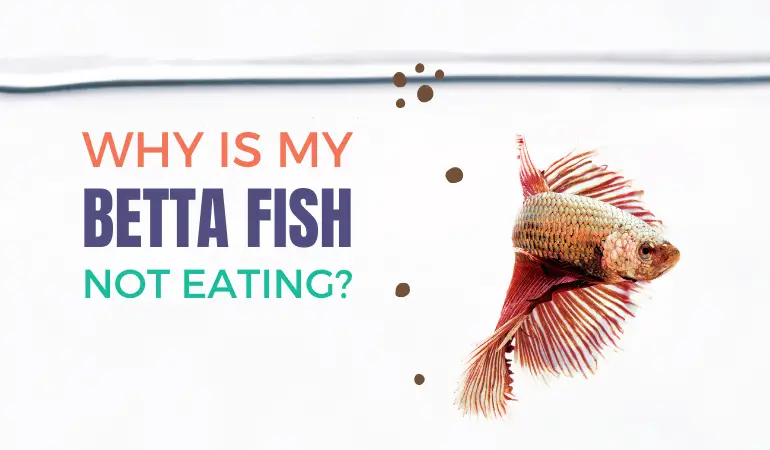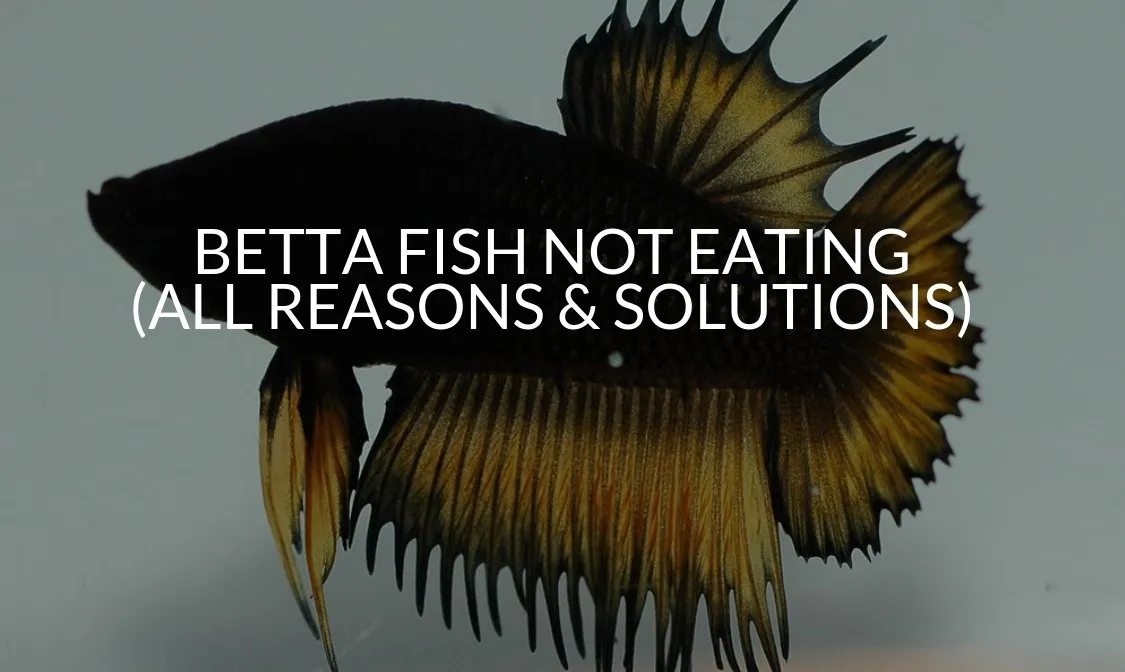Originally posted on May 5, 2023 @ 5:52 pm
Last Updated on 8 months by admin
Betta fish are known for their vibrant colors and unique personalities, but they can also be picky eaters. As a betta fish owner, it can be frustrating when your fish refuses to eat pellets. This can be a common issue, but there are several solutions that can help encourage your betta to eat and stay healthy.
In this article, we will explore the reasons why betta fish may refuse to eat pellets and provide practical tips on how to deal with this issue. Whether you are a seasoned betta fish owner or a beginner, this guide will provide you with the knowledge and tools to ensure your betta fish is happy and healthy.

Dealing with Betta Fish That Refuse to Eat Pellets
Betta fish are known for their vibrant colors and long, flowing fins. They are also popular aquarium pets because of their easy-to-care-for nature. However, sometimes betta fish can be picky eaters, and they may refuse to eat the pellets that are commonly fed to them. This can be a frustrating experience for fish owners, but there are several ways to deal with betta fish that refuse to eat pellets.
Understanding Betta Fish Nutrition
Before we dive into how to deal with betta fish that refuse to eat pellets, it’s important to understand their nutritional needs. Betta fish are carnivores, which means they need a diet that is high in protein. Pellets are a common food choice for betta fish because they are easy to store and convenient to feed. However, not all pellets are created equal. Some pellets may contain fillers or other ingredients that are not beneficial for betta fish.
When choosing pellets for your betta fish, look for high-quality pellets that are specifically formulated for betta fish. These pellets will typically have a higher protein content and fewer fillers. It’s also important to vary your betta fish’s diet by offering a variety of foods, such as frozen or live foods like brine shrimp or bloodworms.
Identifying the Problem
If your betta fish refuses to eat pellets, the first step is to identify the problem. There are several reasons why a betta fish may refuse to eat pellets. It could be due to the quality of the pellets, the water temperature, or even stress. Stress can be caused by a variety of factors, such as overcrowding, poor water quality, or a new environment.
To identify the problem, observe your betta fish closely. Look for signs of stress, such as clamped fins or hiding behavior. Check the water temperature and quality to ensure they are within the appropriate range for betta fish. If you suspect the quality of the pellets is the problem, try offering a different brand or type of pellet.
Alternative Foods
If your betta fish continues to refuse pellets, it’s time to explore alternative food options. Betta fish are carnivores and require a high protein diet, so it’s important to choose foods that meet their nutritional needs. Frozen or live foods like brine shrimp, bloodworms, or daphnia are great options for betta fish. These foods are high in protein and are similar to the types of food betta fish would eat in their natural environment.
When offering alternative foods, it’s important to do so in moderation. Overfeeding can lead to health problems like bloating or constipation. Offer small amounts of food once or twice a day and remove any uneaten food after a few minutes to prevent overfeeding.
Feeding Techniques
Sometimes, the problem with betta fish refusing pellets may not be the food itself, but how it is being fed. Betta fish are surface feeders and prefer to eat from the top of the water. Pellets that sink to the bottom of the tank may go unnoticed by your betta fish.
To ensure your betta fish is getting the food they need, try feeding them in a different way. Use a feeding ring to keep the pellets on the surface of the water, or try using a pipette or turkey baster to target feed your betta fish. This will ensure that the pellets are being eaten and not going to waste.
Soaking Pellets
If your betta fish is still refusing pellets, try soaking them in garlic juice or betta fish conditioner. This will add flavor to the pellets and make them more appealing to your betta fish. Soaking pellets also makes them softer and easier to digest, which can be beneficial for betta fish with sensitive digestive systems.
To soak pellets, simply mix them with a small amount of garlic juice or betta fish conditioner in a separate container before feeding them to your betta fish.
Benefits of Pellets
While alternative foods can be beneficial for betta fish that refuse pellets, it’s important to remember the benefits of pellets. Pellets are a convenient and easy-to-store food option that can provide your betta fish with the nutrition they need. They also help maintain water quality by producing less waste than live or frozen foods.
Pellets vs Alternative Foods
When deciding between pellets and alternative foods, it’s important to consider the pros and cons of each. Pellets are convenient and easy to store, but they may not be as appealing to betta fish as live or frozen foods. Alternative foods are more similar to the types of food betta fish would eat in their natural environment, but they can be more expensive and require more effort to prepare.
Ultimately, the decision between pellets and alternative foods depends on your betta fish’s individual needs and preferences. It’s important to provide a varied diet that meets their nutritional needs and keeps them healthy.
Conclusion
Dealing with betta fish that refuse to eat pellets can be a frustrating experience, but there are several ways to address the problem. Start by identifying the problem and exploring alternative food options like frozen or live foods. Try feeding techniques like using a feeding ring or soaking pellets in garlic juice or betta fish conditioner. Remember to vary your betta fish’s diet and provide a balanced and nutritious meal plan. With a little patience and effort, you can ensure your betta fish is happy and healthy.
Frequently Asked Questions
What should I do if my Betta Fish refuses to eat pellets?
If your Betta Fish is refusing to eat pellets, there could be several reasons behind it. One of the main reasons could be that your fish is not used to eating pellets. In such cases, you should start by gradually introducing pellets into their diet. Try feeding them a small amount of pellets and see how they react. If they refuse to eat it, try again after a few hours. You can also try soaking the pellets in garlic water, which can stimulate the fish’s appetite.
If your Betta Fish still refuses to eat pellets, you can try feeding them live or frozen food. Betta Fish are carnivorous and enjoy eating live or frozen food, such as brine shrimp or bloodworms. Alternatively, you can try switching to a different brand or type of pellet that might be more appealing to your fish.
Why are my Betta Fish not eating their pellets?
There could be several reasons why your Betta Fish is not eating their pellets. One of the reasons could be that the pellets are too large for your fish’s mouth. In such cases, you can try breaking the pellets into smaller pieces. Another reason could be that the pellets are not of good quality, and your fish can sense that. In this case, try switching to a different brand or type of pellet.
Betta Fish can also refuse to eat pellets if they are stressed or sick. Observe your fish’s behavior and look for any signs of illness or stress. If you suspect that your fish is sick, it’s best to consult a veterinarian.
How often should I feed my Betta Fish pellets?
Betta Fish should be fed small meals throughout the day, rather than one large meal. You can feed them pellets 2-3 times a day, but make sure not to overfeed them. Overfeeding can lead to health problems such as constipation and obesity. Only feed your Betta Fish the amount of pellets they can consume in 2-3 minutes.
Can Betta Fish survive without pellets?
Yes, Betta Fish can survive without pellets. In the wild, Betta Fish feed on live food such as insects and larvae. If your Betta Fish refuses to eat pellets, you can feed them live or frozen food such as brine shrimp or bloodworms. However, it’s important to make sure that the live food is free of parasites and disease.
Should I soak pellets before feeding them to my Betta Fish?
Soaking pellets before feeding them to your Betta Fish can make them more palatable. Soaking the pellets in garlic water can also help stimulate the fish’s appetite. However, if you’re using high-quality pellets, soaking them is not necessary. Make sure to only soak the pellets for a few minutes, as leaving them in water for too long can cause them to break down and lose their nutritional value.

Why Wont My Betta Fish Eat His Pellets, What to do?
In conclusion, dealing with betta fish that refuse to eat pellets can be a frustrating experience for any fish owner. However, there are several steps that you can take to encourage your betta to eat.
Firstly, try offering your betta a variety of foods such as frozen or live foods. This can entice them to eat and provide them with the necessary nutrients they need to thrive.
Secondly, consider adjusting the water temperature in your tank as bettas are known to be more active and hungry in warmer temperatures.
Lastly, it’s important to monitor your betta’s behavior and health closely. If they continue to refuse food or show signs of illness, it’s best to consult a veterinarian or an experienced fish keeper for advice.
By following these steps and being patient, you can help your betta regain their appetite and enjoy a healthy, happy life in their aquarium.
